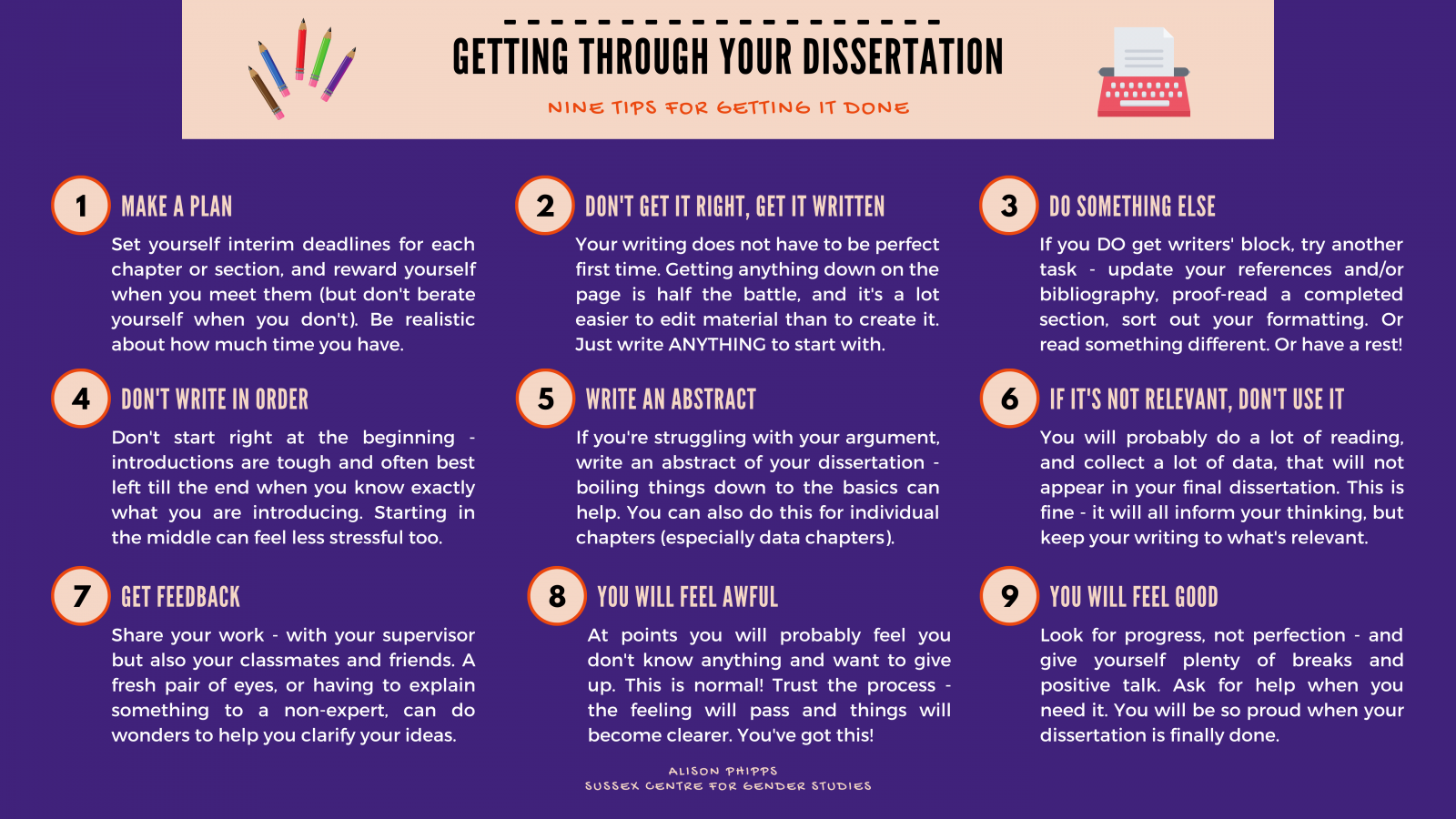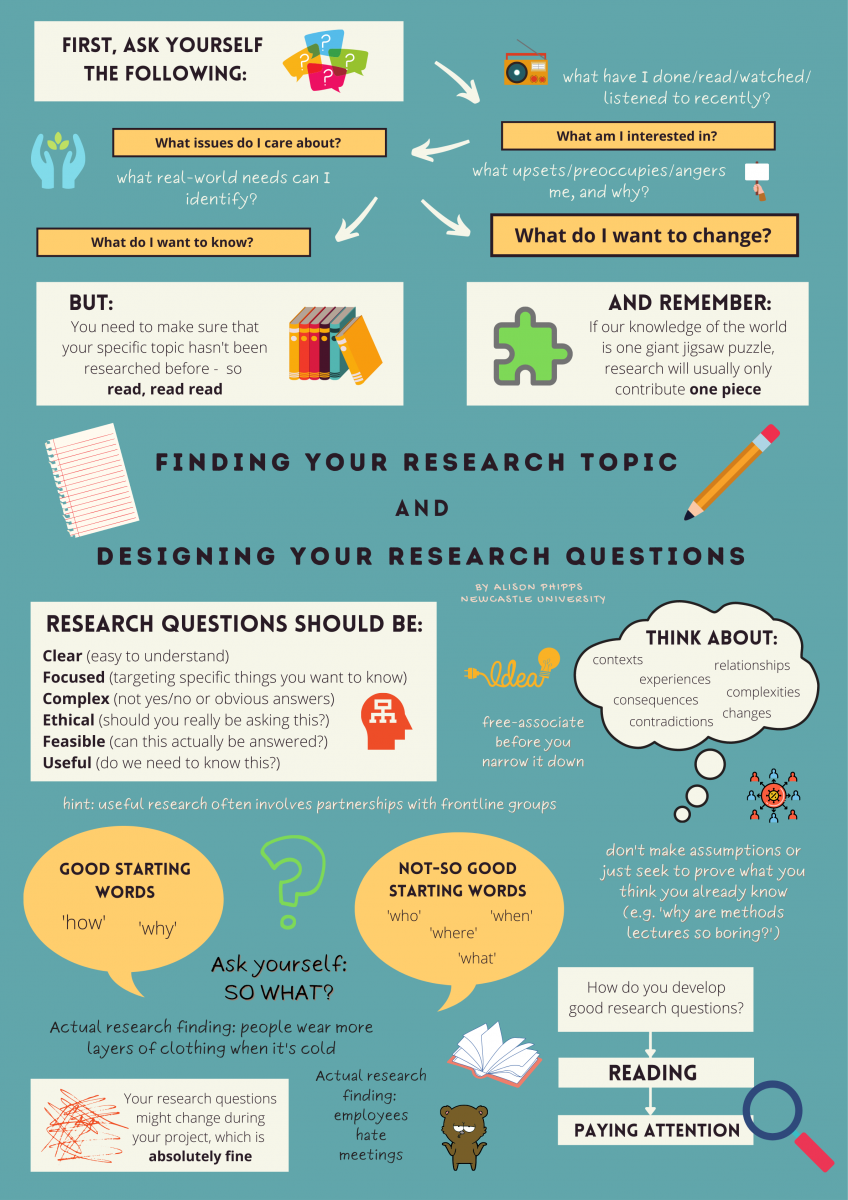Dissertations
What do you want to learn about?
Click on the links below to move to the corresponding page of this section:
 Sussex students working in library
Sussex students working in library
For many students, writing their final-year or master’s dissertation can be very daunting. It’s often the longest piece of work that they have ever written. It’s normal to feel overwhelmed both before you start, and during the process. But remember – thousands of dissertations are written every year, and if you have got this far in your studies, you are more than ready to create yours.
FAQ's by students answered by Ant, Ruth, Chris and Clare
- 1. What’s different about writing a dissertation?

Chris's reply: Great question. The first thing to say is that often a dissertation really is longer than anything else you’ve ever written. And this is actually a great thing. For the first time, for many of us, writing a dissertation is when we really can’t do it at the last minute. It’s just not possible. So, you can look ahead in your diary to perhaps two weeks before it’s due and you’ll know that, ideally, depending on your project, you’ll have it more or less done at that point and that should make you feel a lot calmer at this point. Another thing that’s important is the question of originality. Some people will be using new methods, some people will be finding new evidence, forming different interpretations based on the evidence. But remember that dissertations across different fields have different definitions of originality. And, at the very least, what you can be excited about with your dissertation, is that you’ll clearly explain what you did and why you did it and that, at the least, is your contribution.
- 2. How do I get started writing my dissertation?

Ruth's reply: One of the ways to get started on writing your dissertation is focusing on quantity rather than quality. What do I mean by this? Well, instead of worrying if each sentence is written in the correct format, or whether you are meeting the assessment criteria; just focus on writing. Getting something down on the page. It could be a few bullet points of key ideas. Perhaps your thoughts about the research process, or your reflections on some articles that you have read. Doesn’t really matter because the only person who is going to see this at this stage is you. Later on, you can go back in and improve the quality of your writing. But at this early stage, or when you just want to get started; don’t worry about quality- just worry about quantity and get something written down, and later on you can improve the quality.
- 3. How should I structure my dissertation, are there examples?

Chris's reply: The exact structure of a dissertation will vary across departments and subject areas, so check with your advisor, check with your department, what are their parameters. You should definitely take a look at a previous dissertation. Please do this. It’s really helpful to see on paper roughly what it looks like, how it’s structured. You can look at the content only in a minor way, focus on how they structure their piece. Finally, you can probably list for yourself things you think should be included in a dissertation, even before you think about it formally.
- 4. How do I find literature around my topic?

Ant's reply: That’s a really good question. Perhaps, unsurprisingly, for a librarian, I would recommend library search and your subject guides. So library search is the tool right at the top of the library home page and that is doing the broader search across the widest variety of our resources, so that’s looking at all the books we have in the library, all of our eBooks, all of our journals. The majority of our collections are available digitally as well, so you don’t need to be in the building or on campus to use them. So, that’s a really good place to start typing in your key words there and then looking on your subject guides as well. So, on your subject guides, you’ll find the resources that are the most specific to your subject area. So, we have over 200 databases in addition to library search, and what we’ve done to make things easier is to pull the relevant ones onto the relevant guide, so you’ll find all the ones related to history on the history subject guide.
Once you're in the data bases superficially, they all look quite different, but fundamentally they all work in a really similar way, so you can take the same approach. What you might what to think about are your key words, so what are you looking for? How you put those key words together. The more key words you have, the fewer results you get back, you're going to narrow down the scope of your search. The other thing to think about is the filters. All databases will have some sort of filtering system, normally on the left-hand side, sometimes on the right. And you can filter things by like year of publication, if you're after recent things, like particular topics or subject areas, even by peer review if you’re trying to surface the higher quality material. So, I would use library research, use your subject guide and think about the approach you are taking, think about the key words - that’s really important, and think about the filters that will help you narrow down.
- 5. How do I use search terms to find relevant sources?

Ant's reply: Ok, so when you’re using these academic data bases, there are certain commands you can use and ways you can put together different key words to either narrow down your results to bring fewer things back or broaden it out and bring more things back. So a couple of examples, what I think is really important to keep in mind is these data bases are very literal and will only do exactly what you tell them to do, which can be a real benefit means you’ve got a lot of control over it. But if you're looking at a topic where researchers and authors might talk about the same thing in different ways, databases might not necessarily bring back everything that you're interested in. So for example if you were interested in child psychology let say, and you were looking for well children, you wouldn’t necessarily get the words back teenagers, juveniles, adolescence, so what you want to do is think about those alternative terms to make sure you don’t miss out on anything important. Then when you’ve got them you can put them together and prompt the data base to look for one or the other. So the default of all of these systems is they will look for all of these, whatever word you type in, but you can say look for this, or this, or this simply by typing or in capital letters (“OR”) between those key words. So, you can have “children OR adolescence”, and it’s really important or is in capital letters because it tells the data base it’s a command and not another word its searching for.
The second kind of command erm which can be really useful at sort of the other end of the spectrum, narrowing things down are speech marks (“”). So if you put in two words so say we put in the word study and skills and we were looking for those and everything that came back in the results, if library said its looking and it brings back eBooks, or full text articles it might be that its finding the word ‘study’ in one place maybe in the title, and then skills somewhere completely different, in chapter 8. so if you want two or more words to appear next to each other just put speech marks around them and this will make a huge difference it will mean you get fewer things back and those things you get back will be more relevant. A lot of data bases will have an even more sophisticated way of searching so you can search words within 5 of each other, or you can look for words not to appear. But I would say to the ‘OR’ operator or the speech marks they are really transferable, and they’ll probably work on 95% of our databases.
- 6. How do I decide if a source is credible?

Ant's reply: Ok so, this is a really important skill. I think, one that it may be getting harder and harder because as we all know it can be really hard to tell at a glance what is trust worthy, what is reliable, what is authoritative, and fake news is a really good example of that, coming out at first glance they look like they could be believable. It’s really important at every stage of your research that you try to take a critical approach to it and you want to be critically thinking about every decision that you make and I think particularly about when you get results back, which results you're going to use in your bits of work. You want to choose something that is appropriate and suitable for academic study. So, firstly using tools like library search and the databases on your subject guides will help with that. They are designed specifically for academic study, tutors and researchers in your subject area have asked us to buy them for you, so you know they are going to be higher quality, more appropriate, more authoritative. within those you can often look for peer review, with peer reviewed articled they’ve gone to a panel of experts, researchers in that field, they’ve looked at that article before it’s been published and said yep that’s good for publication.
Again thinking critically, there are some issues with peer review, and you will increasingly find with open access journals, there are some brilliant pieces of research that aren't peered review its not necessarily, it’s a very quick and easy way of potentially surfacing higher quality material but it isn't infallible. When you're looking at online resources, I think that can be even trickier, so when you're looking at websites for example documents. So, there's lots of different approaches but essentially, what you’re looking for is the author, so you want to see whose written it, how kind of authoritative, how reliable, you want to look to see if its biased, a lot of things will be biased and an acknowledgement of that not necessarily trying to irradiate that but being aware of that possible how recent it is, if looking at a really fast moving subject area appropriate to be using a journal article from 10 years ago thinking about those sort of materials, also tools like Scopus and web of science will tell you how often a particular article is published or cited I should say. So, this is a really good way of thinking potentially more written about articles in your field and higher impact ones. Then you want to think critically about this because it could be that something has been cited 200 times, but those people are saying its floored, things have moved on from then, they’ve developed. But it is another way to find yeah some of the more written about articles in your field.
- 7. How do I ensure I have read widely enough and can stop reading and start writing?

Clare's reply: Students often ask us this question. They want to read everything on the topic for their dissertation and often that just isn’t possible. There’s so much written about their topic that you could never read all of it. So, you need to think how much time have you got to write your dissertation? And how much time can you allocate to your reading? Give yourself a deadline and know when to stop doing your research and when to start writing. When you’re searching for articles and literature on your topic for your dissertation, make sure you’re using smart search techniques that we talk about on Skillshub. So, think about having really good key search terms, make sure that you’re really surfacing the material that’s most relevant to your dissertation question, so that you’re reading things that are really really relevant. Also, the most important thing, get some advice! Talk to your dissertation supervisor and see what they can recommend. They will be experts in your area, they will be able to point you towards key thinkers and key writers on your dissertation topic.
- 8. How can I construct an effective argument?

Chris's reply: One of the skillful ways to construct an argument is to keep in mind that ultimately, it’s your interpretation based on the evidence, so focus on the evidence, focus on where your presenting your evidence. In some cases of course you’ll actually be presenting that separately to that text but if your integrating evidence in your text start to pay attention to where it appears in each of your paragraphs and after you’ve drafted a paragraph or after you’ve drafted a section of the dissertation actually highlight every moment where you actually provide or refer to evidence. The strength of your argument will often depend on how closely your interpretation is supported by that evidence, finally always spend time, allocate time to spend coming up with counter arguments this is actually quite enjoyable. Imagine yourself challenging yourself on the key points of your dissertation, can you come up with a counter argument that makes you think twice about what you’re saying? That, ultimately, will strengthen your main argument.
- 9. Do you have any suggestions for managing my time?

Clare's reply: Managing your time when you’re writing your dissertation is a really important skill to develop. Your dissertation is usually the longest piece of writing you will have done when you’re at university and so it’s going to take you a lot longer than it would most of your essays or assignments that you’re writing. So, it’s important to start getting into the habit of writing, even early on in the process, we would recommend finding a specific time in your week when you’re focusing on your dissertation. And it might be that you’re doing research in that time or just jotting down some ideas that you have before you start researching questions that you have. Anything to do with your dissertation, get into the habit of having specific times of the day that are focused on your dissertation. When you get further into the writing process, you might divide your day into e.g. in the morning you might be writing on it and, in the afternoon, you might spend time editing. So, thinking about how you divide up your time and how you schedule dissertation writing is really important.
One technique that we often talk to students about is the ‘Pomodoro’ technique. Now, if you google this, you’ll see lots and lots of examples of how you can organise your time using the pomodoro technique. But, basically, the idea is that you can set a timer to be really really disciplined and give yourself breaks. So, you set your timer for 25 minutes and you just work specifically on a particular piece of work for that 25 minutes, then you have a 5-minute break and then do another 25 minutes. And you repeat this 4 times. After 4 times, then you give yourself a longer 25-minute break. So, you can divide your time up and give yourself rewards in that 25-minute break. Often this motivates people to just get started and do their work.
- 10. How do I keep motivated?

Ruth's reply: Using your imagination can help with motivation. Visualize how you will feel when you have finally handed in your assignment and you know you have done the best you could. Also, think about the bigger picture; why are you doing this assignment? How does it fit in with your long-term goals? It’s going to enable you to learn more about the subject that interests you, and it also helps you to develop skills that will be useful for your future career. So, focus on those things as well. Focus on the bigger picture; imagine yourself when you hand in your assignment. That is going to help keep you motivated with your dissertation work.
- 11. How do I write a good introduction for my dissertation?

Chris's reply: People have different ideas about the introduction. Many argue that you should leave it right to the end before writing it. Others say there’s no harm in writing a rough introduction as a kind of road map at the start, from which you can then build. I’m in the latter camp. I think you actually benefit from not spending too much time on your introduction, but why not just write a rough outline of what you think it would include. Try to be as comprehensive as possible. Write down everything you can imagine going into your introduction for the dissertation. Students often worry about repetition between different sections of a dissertation. When you’re in the writing phase, it can definitely seem like that. You feel like you’re repeating yourself. But, ultimately, if you give yourself enough time for editing, you can then come back to things like the introduction and completely transform it based on what actually happened in the rest of the dissertation.
- 12. What is needed for an effective conclusion?

Chris's reply: To make an effective conclusion one thing you need is your introduction. At some point, give yourself time to put them side by side, ideally literally print them out and put them next to each other on the table and see what does your first, second and third paragraph do in your introduction that is somehow complimented by what your conclusion is doing. You will find you will get ideas of what should be going in your conclusion and what should be going in your introduction by doing this side by side exercise you should also in your conclusion depending on which field you're in provide some indication of what you would do next, or what you would do/ think the field should next to explore this question further, or to explore other questions that have come up in the process of you completing your dissertation. This shows that you’re seriously involved in and invested in continuing the conversation in your area.
- 13. Is there any referencing software approved by the university?

Ant's reply: There are different types of referencing software that are available, there isn’t one per se that is recommended by the university. The most popular ones are endnote, Mendeley and Zotero, and we have information on each of those tools on the subject guides. So, if you go to the library home page, the online resources A to Z, click on that box and then you’ll find one on Zotero, endnote and Mendeley. Endnote is the one which is most traditionally used by the university and you get free as a student and a member of staff. Zotero is a free tool and Mendeley gives you a free option as well. So, there's kind of pros and cons to each, we’ve got a comparison table on each of those pages to tell you what's sort of good and bad about them.
- 14. Should I reference as I go along or leave it to the end?

Ant's reply: Certainly, with the reference managing tools they work best if you’re using them as you’re writing. One thing should say, there are a couple of alternatives. So what people are looking for actually is a citation generator, so this is slightly different to a reference management tool. What a reference management tool will allow you to do is to save all your references, put them into folders. You can annotate them and add notes, and I think of it as an umbrella that sits over all the other data bases and all the other searching you're doing. However, if you just want citations formatted in a particular way and you don’t necessarily want to save that annotation or annotate the kind of associated PDF, you can just use a citation generator, and tools like Zotero bib do that which is like a light weight version of Zotero and there's information about that on the Zotero guide.
- 15. What can I do to improve my writing?

Chris's reply: My experience of writing a dissertation was that in the final few weeks frantic editing, I often ended up doing thing I could have done 2 or 3 months previously. Silly things like setting up the formatting of the document or certain things like writing out my argument in full. Now obviously there are some things you can’t do at an earlier stage; you do keep learning throughout the research and throughout the writing phase. But if you can identify things right now that could just be done, and don’t require several more months thinking about it I recommend you do it. Secondly another tip is you should make yourself accountable to other people, you’ll benefit immensely from talking through your dissertation with others, explaining verbally what it’s all about. You'll also benefit from telling people; friends, family that there are certain dates internal deadlines on which you're going to send them evidence you’ve made progress, this will help in the long run.
The most important aspect of writing a successful dissertation . . . under pressure is to stay organised. Try to reference as you write.” Ghaleb, Third-year Geography student
Look below at this infographic highlighting nine tips for Getting through your dissertation.
Below the infographic, there is a text version for screen readers.

- Getting through your dissertation - Nine tips for getting it done (text version)
1. Make a plan
Set yourself interim deadlines for each chapter or section, and reward yourself when you meet them (but don’t berate yourself when you don’t). Be realistic about how much time you have.
2. Don’t get it right, get it written
Your writing does not have to be perfect first time. Getting anything down on the page is half the battle, and it’s a lot easier to edit material than to create it. Just write ANYTHING to start with.
3. Do something else
If you DO get writers’ block, try another task – update your references and/or bibliography, proof-read a completed section, sort out your formatting. Or read something different. Or have a rest!
4. Don’t write in order
Don’t start at the beginning – introductions are tough and often best left till the end when you know exactly what you are introducing. Starting in the middle can feel less stressful too.
5. Write an abstract
If you are struggling with your argument, write an abstract of your dissertation – boiling things down to the basics can help. You can also do this for individual chapters (especially data chapters).
6. If it’s not relevant, don’t use it
You will probably do a lot of reading, and collect a lot of data, that will not appear in your final dissertation. This is fine – it will all have informed your thinking, but keep your writing to what’s relevant.
7. Get feedback
Share your work – with your supervisor but also with your classmates and friends. A fresh pair of eyes, or having to explain something to a non-expert, can do wonders to help you clarify your ideas.
8. You will feel awful
At some point, you will probably feel you don’t know anything and want to give up. This is normal! Trust the process – the feeling will pass, and things will become clearer. You’ve got this!
9. You will feel good
Look for progress, not perfection – and give yourself plenty of breaks and positive talk. Ask for help when you need it. You will be so proud when your dissertation is done.
This infographic was created by Professor Alison Phipps.
Initial advice and guidance
This section covers, finding a Dissertation topic, getting some inspiration and structuring your Dissertation.
In this YouTube webinar, two Academic Skills Consultants offer top tips for clarifying your argument, improving your academic style, and reducing or increasing word count to help you produce a well-structured and coherent piece of work.
Access our Writing Your Dissertation Canvas resources where you can:
- hear from students also writing their dissertations
- get advice from professional writers with the Royal Literary Fund
- listen to a podcast guide talking you through the process of writing your dissertation
- watch videos answering frequently asked questions about dissertations.
Remember that you have made it to the last term of third year [or beyond]; you have got this far because you are a capable and talented individual; use the confidence you have earnt from this to bring flair and originality to your work.” Ghaleb, Third-year Geography student
Finding a Dissertation Topic
One of the most important things to consider is the topic of your dissertation. Getting stuck for inspiration can be a reason to procrastinate for many students. Don’t think that you need to find the ‘perfect’ topic – there isn’t one. A topic that has some potential for an interesting study is enough. It is also normal to change the topic or focus of your dissertation as you do more research and refine your ideas, so don’t worry about choosing your final topic yet.
Look below at this infographic 'Finding your research topic and designing your research questions'
This infographic is suitable for undergraduate, MA, and PhD students. Below the infographic, there is a text version for screen readers.

- Finding your research topic and designing your research questions (text version)
First, ask yourself the following:
1. What am I interested in? (what have I done/read/watched/listened to recently?)
2. What issues do I care about? (what upsets/preoccupies/angers me and why?)
3. What do I want to know? (what real-world needs can I identify?)
4. What do I want to change
(In big writing) What do I want to change?
BUT: You need to make sure your specific topic hasn’t been researched before – so read, read, read.
And remember: if our knowledge of the world is one giant jigsaw puzzle, research will usually only contribute one piece.
Research questions should be: clear (easy to understand); focused (targeting specific things you want to know); complex (not yes/no or obvious answers); ethical (should you really be asking this?); feasible (can this actually be answered?); useful (do we need to know this?)
Hint: useful research often involves partnerships with frontline groups.
Think about: contexts, relationships, experiences, consequences, complexities, changes, contradictions. Free-associate before you narrow it down. Don’t make assumptions or just seek to prove what you think you already know (e.g. ‘why are methods lectures so boring?’)
Good starting words – how and why. Not-so-good starting words – who, when, where, what.
Ask yourself: SO WHAT? Actual research finding: people wear more layers of clothing when it’s cold. Actual research finding: employees hate meetings (so what?)
How do you develop good research questions? READING and PAYING ATTENTION.
Your research questions might change during your project, which is absolutely fine.
This infographic was created by Professor Alison Phipps.
Getting some inspiration
Activity
Below the activity is a text-only version.
To get some ideas of where to begin, click on the nine sections of the coloured wheel below and reflect on what you could write about:
- Text version of the nine ideas
- an area of your subject that you already know well
- an area of your subject that really interests you
- an area of your subject that you have strong opinions about
- a problem in your area of study that you would like to investigate
- suggestions that you have read about for further research in the topic
- some new data about a topic
- an existing theory that you could apply in a new way
- existing research that you could apply to a new group of people
- an existing method that you could apply to a new set of materials.
Checking your topic
Your topic needs to be unique, specific and viable. Can you answer 'yes' to the following questions?
Unique:
- have you found student dissertations on the same topic, but that differ in one or more obvious ways?
- have you identified scholars who have written about your topic and identified journals with relevant articles?
- have you seen other methodologies used for different topics that could apply to yours?
Specific:
- can you explore your topic or question satisfactorily within the word limit?
- will you be able to complete all your research and writing in the time available?
Viable:
Have you discussed your topic with other people who know the subject?
- have you made sure that there are enough relevant and up-to-date materials available on your topic?
- if you are involving participants in your research, have you checked the ethical and data protection guidelines?
Talk to your lecturers, your supervisor, your course mates. They offer the chance not just for a fresh perspective, but also for you to develop your reasoning.” Josie, former third-year Global Studies student
Structuring your Dissertation
Types of Dissertations
There are two main types of dissertations: practical and theoretical.
Practical dissertations
These focus on primary research, with you gathering the data yourself.
- data can be constructed, e.g., computer models, lab experiments
- data can be explored, e.g., case studies, interviews, field observation.
Theoretical dissertations
These focus on secondary research, with you using data that has been collected and presented by other researchers to develop an argument.
- arguments can be conceptual, e.g., on feminism, racism, sustainability
- arguments can be applied, e.g., applying economic, social or environmental theory to a real-life situation.
Source: Trevor Day (2018), Success in Academic Writing, 2nd ed. Palgrave, p.108
Structuring your dissertation
Practical and theoretical dissertations share a lot of the same structure but differ in a few key areas. These Word and PDF (remember, the PDF will open in this window. Click on the browser's back button to return to the Skills Hub) documents contain a table that gives some information on what to include in each section.
Critical versus descriptive writing
A theoretical dissertation contains only critical writing, whereas some sections of a practical dissertation use descriptive writing. Make sure you are clear on the differences between them or go to Critical Thinking for more details.
Activity
Look at the four questions below about Critical versus Descriptive writing. Below the activity is a text-only version.
- Text only version (this is the answer)
Critical writing Descriptive writing Identifying if an idea is defensible Listing details Explaining the relationship between structures or concepts Giving information Weighing up the significance of things/ideas Describing examples Drawing conclusions Explaining how a process works
Abstracts
An abstract is a short summary of your dissertation, which includes these main ideas:
- what you examined. State your research question clearly and concisely
- the reason for undertaking this study
- for practical dissertations: What you did and how you did it
- for practical dissertations: The results that you achieved
- for theoretical dissertations: The themes that you identified and synthesised in the literature. Make sure to list them in the same order you write about them in your main body
- for theoretical dissertations: How you analysed these themes to reach your conclusion
- the conclusions that you draw
- depending on the dissertation: Any recommendations that your research leads you to make.
An abstract doesn’t have references. To refer to your own study, e.g., This dissertation examines…, use the present tense.
Source: This section is adapted from material originally from the University of Plymouth
Imagine a friend asks you what your dissertation is about. Sum up in one sentence, for a non-expert, what it's about. If you can do this, you know you have refined your idea.” Ghaleb, Third-year Geography student
Introductions
An introduction is similar to an abstract but concentrates more on the context of your study and only refers to your initial hypothesis or argument. It ends with an explanation of structure of the dissertation plan but doesn’t go into depth about the results or conclusions.
- grab your reader's attention - why is this study of interest?
- context - show how your study fits within your discipline in general
- focus in on the narrower context, within the sub-discipline
- aims of the study - could be questions to answer or hypotheses to test
- introduce your argument
- overview of structure of dissertation.
Literature reviews
A literature review is a critical examination of the secondary sources that you have selected. Your aim in the literature review is to demonstrate your awareness of the current theories, contrasting schools of thought, and relevant writers; what has influenced your ideas, and your own research skills.
Misunderstandings about literature reviews
Activity
Below the activity is a text-only version.
- Text only version (this is the answer)
I must include everything that has been written on my topic answer I must thoughtfully select the most relevant literature for my argument.
It should be a descriptive summary of the existing literature answer It should be a critical analysis of the existing literature.
I need to list each writer’s opinion answer I need to synthesise the main opinions in the area.
It includes my personal opinions on the subject answer It includes my interpretations of the ideas, based on evidence.
Don't feel like you should be comparing where you're at with others. It's not a competition, you'll get a lot more from the process by sharing your issues (no matter how trivial you think they are), brainstorming, even ranting, than you'll ever get from asking everyone how much they've written, or boasting that you're nearly finished. Josie, Third-year Global Studies
Writing your Dissertation
The most difficult part! It can seem like a huge mountain to climb, but you can do it. Since it is a huge project, the key is to break it down into manageable steps that you can tackle each day.
Time Management
You have to be organised with your time to complete your dissertation. Check the Time Management pages for useful general advice. You’ll need to pay special attention to the following:
Allocating time
It’s a long project so make sure you include all the tasks and try to estimate how long each will take. Allow extra time. Dissertations may include:
- booking access to rooms, people or equipment
- finding and contacting participants
- surveying and interviewing participants
- transcribing interviews
- data analysis
- accessing particular literature which isn’t readily available in the library or online
- learning new skills such as creating questionnaires, coding, designing charts, analysing data.
 Sussex students working on their dissertation
Sussex students working on their dissertation
Scheduling time
Draw up a timetable as early as possible, including not only the writing, but also the research and the planning. Remember to include time for editing and proofreading at the end. As always, start with the deadline and work backwards.
If you leave paragraphs or sentences half-finished or informally drafted, highlight them and note down their position in the document before you move on. Ghaleb, Third-year Geography student
Ordering your writing
Think about the order for writing your dissertation. This is one way of doing it:
- work out chapter headings
- write a couple of sentences about the content of each chapter
- write the section headings for each chapter
- divide each section into subsections, in logical order
- draft a topic sentence for the point for each paragraph within each subsection
- estimate the number of words for each section, then each chapter, then for the dissertation in total.
Source: Trevor Day (2018), Success in Academic Writing, 2nd ed. Palgrave, p.111
Alternatively, you could start with the total word count and divide it up into chapters. Then sub-divide each chapter into sections and sub-sections.Remember to adjust the lengths of the chapters to make sure you are focusing on the most important sections. The literature review and discussion are the most substantial sections.
It can be difficult to cut things when you're reaching the word limit, but if you've spent enough time writing it you should know the material, know how to synthesise it, perhaps recognise where you've made the same argument several times in slightly different ways. Josie, Third-year Global Studies
Other topics in this section relating to Writing and assessments:
Critical essay writing | Reflective writing | Reports | Dissertations (this page) | Academic writing style, editing and proof-reading | Feedback